|
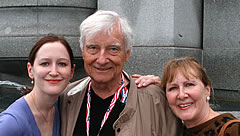
Granddaughter Maggie Kozicharow (left) and daughter Allison Kozicharow with Dick Gilbert
WiRED founding board member, Dr. Richard Gilbert, is a World War II veteran who recently enjoyed an all-expense paid trip to Washington, D.C. to see the WWII Memorial. Rotarians, who supported the formative work of WiRED in the Balkans and Central America, are sending vets on similar trips to Washington from all over America. Gilbert, a twice-wounded and decorated veteran of combat with the 94th Infantry Division in France and Germany, records his impressions of that memorial trip.
On a rain-drenched day in October, a chartered US Airways 737 took off from Asheville, N.C. bound for Washington, D.C. It was capacity-loaded with 100 ex-soldiers and sailors, airmen, and marines who had served in World War II. Called the Air Honor flight, the objective was to show the WWII Memorial to veterans whose generation is dying at the rate of more than 5,000 per week, according to VA statistics.
Sprinkled about the plane were our "guardians," volunteers from the Western NC Rotary Clubs that sponsored and paid for the one-day round trip. With one guardian per wheel chair and one for each group of three walkers, they watched over us like gentle shepherds, never patronizing but ever alert for a medical emergency. A doctor, a paramedic, and aides were aboard. My octogenarian group was in the care of Penny Cook, a young woman who gave the word "banker" a positive spin.
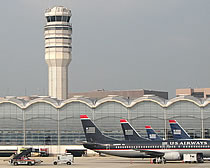
Washington National Airport
Setting down in Washington National Airport, the Honor Air gang was amazed at the reception: sirens piercing the air, trucks from the fire brigades played their canons across our path, geysers of water pyramiding over the plane, moving slowly like the maiden voyage of an ocean liner passing the Statue of Liberty.
At the in-coming gate, an honor line of volunteers—boy scouts, military personnel, sailors, police, fire fighters, and Rotarians—formed a gauntlet along with a couple of hundred people who had braved security at dawn to yell "Thank you for your service!" Flags and banners (for example, "Greeting to the Greatest Generation") bedecked our pathway.
Outside, our three buses awaited, soon joined by a battery of squad cars for a police escort. As we whizzed across the bridge over the Potomac and the few blocks to the National Mall, we stared at passengers in their grid-locked cars. What must they be thinking of the gray and balding heads for whom traffic was being stopped?
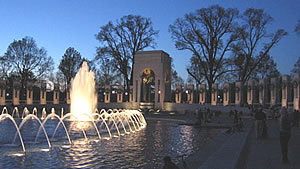
World War II Memorial
Promptly at 11:00 a.m., our buses braked into the curb before the WWII Memorial, a vast semicircle of marble enclosing the huge Rainbow Pond. 43-foot arches divided the Atlantic and Pacific campaigns. Pillars represented states and quotations adorned the walls. One wall, graced with a waterfall, was punctuated with a gold star for each 1,000 dead, a grim reminder of the 442,000 American lives lost in that war. "The only real heroes," someone said.
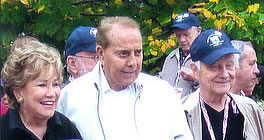
Elizabeth and Robert Dole with Dick Gilbert
Senator Bob Dole, who meets most of the Honor Flights, said a few words in greeting and was joined by a gracious Senator Elizabeth Dole who thanked her husband for joining his fellow vets. Following a photo op with the Doles, family and friends surprised some of us (happily for me, by a daughter and granddaughter).
Together the group shared a light lunch under a white tent, the slight drizzle outside occasionally penetrated by a brilliant flash of sun, and soon it was time for a whirlwind visit to the other major memorials. At the Korean Memorial, countless photos taken at the time were sandblasted into a granite wall adjacent to statues of an infantry squad on patrol. Very realistic and thought provoking. As for the highly publicized Vietnam Memorial, "The Wall" is everything as advertised. Its black and shining surface filled with names of the fallen, etched into marble so paper impressions can be made, is more evocative and moving, at least to me, than the marbled impersonality of the WWII monument.
Nearby in the shadow of the stately Lincoln Memorial, we rejoined our bus for a final visit to a miraculous and melancholy place—the Arlington Cemetery. Whirling back across the Potomac amidst a labyrinth of roads, our bus arrived just before the changing of the guard at the Tomb of the Unknown Soldier. Silent as death, a single soldier paced his brief line before the tomb, halting in each direction to balance his rifle perpendicular to his nose. He paused dramatically and snapped the glistening rifle back to right-shoulder. Spinning to an about-face, he repeated his formal rounds.
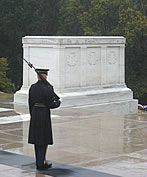
Tomb of the
Unknown Soldier
Precisely on the hour, a sergeant approached, followed by a fresh guard. The non-com inspected every inch of the new guard, relieved the old one and walking a new line, turned and ceremoniously saluted the Unknown Soldier. He then turned about-face and saluted the countless graves in the other direction. After a solemn silence, the sergeant sent the fresh soldier on his solitary path.
It was so clocklike and simple—no battalions on parade—just that lone infantryman, flawlessly making his sorrowful rounds. It would take a hardened vet to hold back patriotic tears. Struck with the proud military bearing and youthfulness of the guards, one wondered if we were ever that young.
From Arlington, we swept back into Washington National where a 737 refused to fly, and we were hustled into a substitute for the one hour flight home. At the Asheville airport, another display of affectionate respect awaited us. A raucous country band split the air and a mob of smiling people with signs and flags shook hands and thanked us yet again. What a rare time for the grateful but not yet dead!
Even then, the Rotarians were not done. A corps of volunteers had filled our travel bags with letters and thank-you cards collected from school children and others. Penny gave us our bags and a goodbye hug.
Later I read a card from a first grade boy. Whereas all the others had addressed notes as "Dear Veteran," he began his letter with "Hello Hero!" Laughing, I thought, "If only he knew!"
Braving a fierce rainstorm, the vets from Honor Air thanked their guardian angels and scattered into cars, prepared, one hopes, to live productive lives before the last of Tom Brokaw’s Greatest Generation fades into that good night.
^ Back to the Top
|



